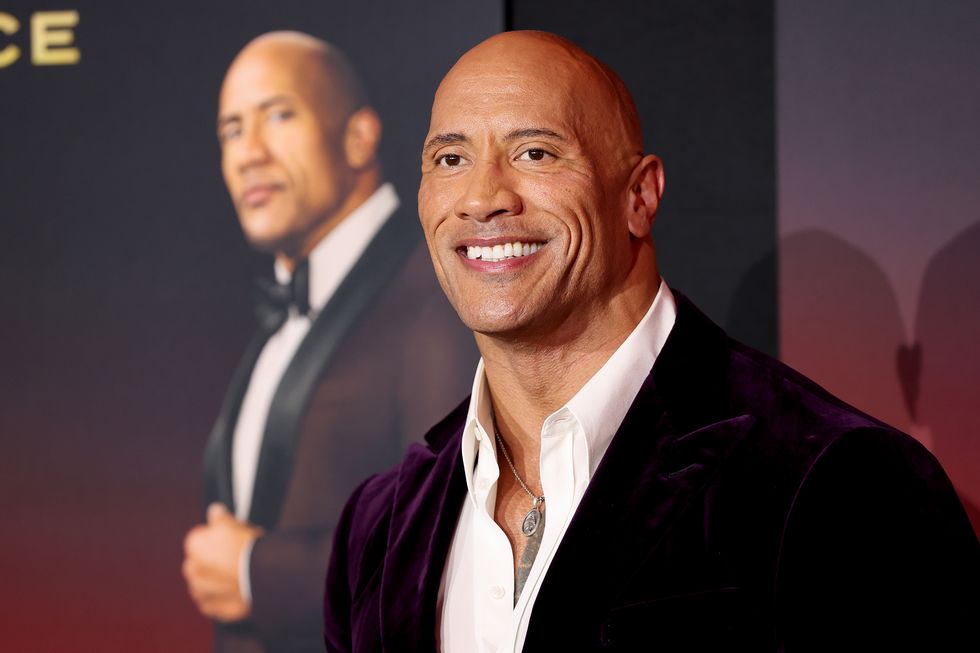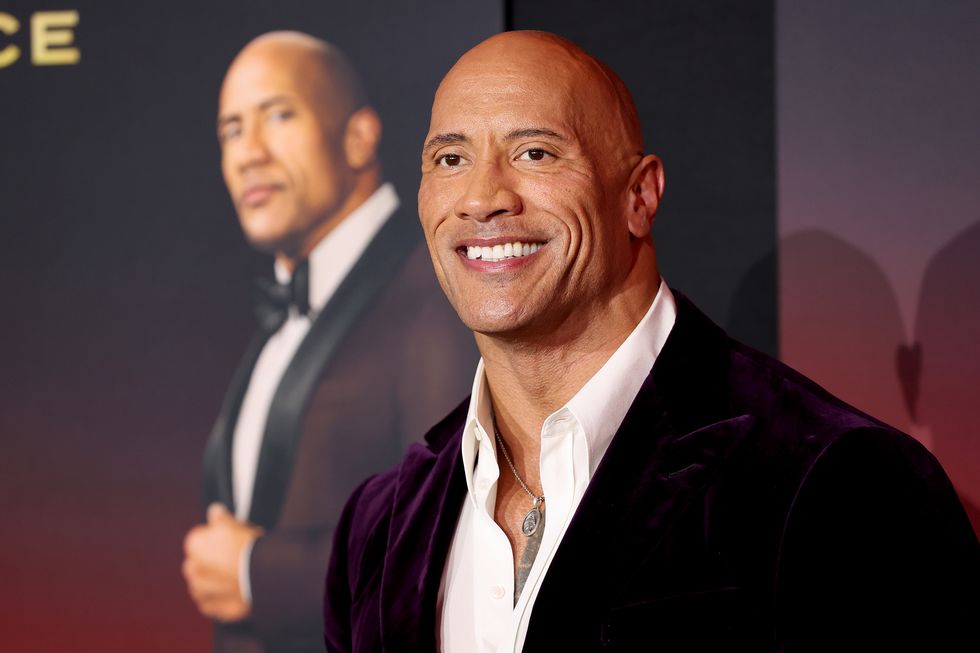
Dwayne “The Rock” Johnson does his leg day breakfast like he does most things: big.
Sirloin steak. Egg whites. Oats with papaya. Five English muffin halves topped with peanut butter and jelly, and an energy drink.
It’s a massive amount of food. But could it help you look more like The Rock?
We asked Kim Yawitz, a registered dietitian and CrossFit gym owner in St. Louis, Mo.
While The Rock didn’t provide exact portion sizes for this massive morning meal, Yawitz says that assuming it’s a 6-ounce steak, 10 egg whites, one cup of oats, a ½ cup papaya, five tablespoons of peanut butter, and 3 ⅓ tablespoons of jelly, this breakfast clocks in at a whopping 1,820 calories, 175 grams of carbohydrates, 16 grams of fiber, 59 grams of sugar, 119 grams of protein, and 73 grams of fat.
“On a positive note, this breakfast provides lots of quick energy in the form of carbs, plus a hefty dose of muscle-building protein,” she says, adding that based on The Rock’s workout routine and size, she would guess The Rock needs at least 591 grams of carbs and between 189 and 260 grams of protein each day to maximize muscle gains.
“While his breakfast puts him well on the way to those estimated targets, I’d like to see him eat less protein in the morning and have a bit more throughout the day. For one thing, there’s some evidence that eating protein-rich foods every few hours is better for muscle gain than eating large amounts in one sitting,” she says.
And even if that weren’t the case, Yawitz highlights that 1,820 calories and 119 grams of protein is just a lot of food to get in before a workout. “That breakfast would leave me more excited about a handful of Rolaids and a nap than a hard workout.”
This content is imported from Instagram. You may be able to find the same content in another format, or you may be able to find more information, at their web site.
Amy Gorin, M.S., R.D.N., says this: “For someone who is training as hard as The Rock, this breakfast provides the high amount of protein and carbohydrates that his body needs. He gets protein that his body can easily make use of via the sirloin and egg whites, as well as plenty of carbs from the oatmeal, papaya, English muffins, and jelly,” she says. “The peanut butter provides healthy fat, and he’s getting caffeine for his day from the energy drink,” she continues, admitting that she would, however, like to see more produce included in the meal—“for instance, some spinach, onions, and mushrooms mixed into the eggs and some additional fruit like mango and berries paired with the oatmeal.”
Just how healthy is The Rock’s breakfast?
Without knowing his medical history, his exact height and weight, and more details on his workout routine, Yawitz says that it’s impossible to say for sure if this meal is healthy for him or not.
From a health standpoint, however, she likes that this breakfast provides about 42 percent of The Rock’s daily fiber needs. “High fiber intake before a workout isn’t always ideal before an intense workout, but eating enough of it throughout the day can help lower your risk of obesity, heart disease, diabetes, and certain types of cancer,” she says, noting that this breakfast is also high in vitamin C, which is a powerful antioxidant that decreases inflammation and cell damage.
“That being said, unless you’re training like a champion, this ‘breakfast of champions’ is way too much food,” says Yawitz. “Eating too many calories over time increases the risk of obesity, diabetes, heart disease, high blood pressure, cancer, arthritis, and premature death,” she says.
The sugar content is pretty astounding, too. “This leg-day breakfast contains [approximately] 59 grams of sugar — the equivalent of more than two servings of Ben and Jerry’s Half-Baked Ice Cream,” she says. Though Yawitz concedes that a bit of sugar is good before high-volume and high-intensity training, she’d prefer to see more of it come from fruit than jelly. Still, “most men should limit their daily sugar intake to 36 grams per day, to reduce the risk for obesity, heart disease, diabetes, and certain types of cancer.”
Gorin: “No, the average person can’t eat this for breakfast! This is a lot of food.”
What should The Rock be eating before a workout?
Even though you shouldn’t feast on a meal like The Rock’s before you hit it hard on the weight bench, a pre-workout breakfast is still essential. As Yawitz puts it, going straight from your bed to the weight room is like starting a long road trip with an empty gas tank. “Glucose is your body’s preferred fuel source during strength training, and unfortunately, your blood glucose levels are relatively low upon waking.”
According to Yawitz, a good pre-workout breakfast gives your muscles some fuel (glucose), allowing you to work harder in the gym. “Case in point: In one study, men who ate breakfast were able to perform 10 more back squats and 2 more bench presses before hitting failure, compared to men who skipped breakfast,” she says.
At a minimum, Yawitz says that a good pre-workout breakfast should include carbohydrates and protein. “But beyond those basic requirements, the ideal pre-workout breakfast comes down to meal timing and workout intensity,” she says.
If you’re tempted to skip breakfast before an early morning lifting session, run, yoga, or what have you, Yawitz stresses that something is better than nothing, even if you work out at the crack of dawn. “I typically grab a banana and a protein shake while heading out the door for my 5:30 a.m. CrossFit class,” she says. “This breakfast provides me with glucose and fructose for quick energy, plus a bit of protein, so I can get a head start on my daily protein goals. It’s also low in fat and fiber, so it doesn’t upset my stomach.”
Have a couple of hours to digest before your workout? “You can get away with a bigger breakfast — like an egg white scramble with veggies and cheese and a couple of slices of whole wheat toast,” adds Yawitz.
For the average athlete who isn’t training professionally like The Rock, Gorin, too, emphasizes that you still need a combination of protein and carbs prior to training. “This is because the protein before your workout makes amino acids available to your muscles for use during exercise, and the carbs provide fuel for your exercise,” she explains. “How much protein depends on factors such as the type of workout, your age, and gender. But if you’re going for a hard run, for example, you would want to aim for 25-40 grams of protein in a meal.”
This content is created and maintained by a third party, and imported onto this page to help users provide their email addresses. You may be able to find more information about this and similar content at piano.io
